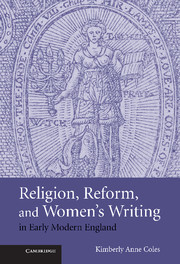Book contents
- Frontmatter
- Contents
- Acknowledgments
- Abbreviations
- Introduction: Making sects: women as reformers, writers, and subjects in Reformation England
- 1 The death of the author (and the appropriation of her text): the case of Anne Askew's Examinations
- 2 Representing the faith of a nation: transitional spirituality in the works of Katherine Parr
- 3 ‘[A] pen to paynt’: Mary Sidney Herbert and the problems of a Protestant poetics
- 4 A new jerusalem: Anne Lok's ‘Meditation’ and the lyric voice
- 5 ‘A Womans writing of diuinest things’: Aemilia Lanyer's passion for a professional poetic vocation
- Afterword
- Notes
- Index
5 - ‘A Womans writing of diuinest things’: Aemilia Lanyer's passion for a professional poetic vocation
Published online by Cambridge University Press: 06 July 2010
- Frontmatter
- Contents
- Acknowledgments
- Abbreviations
- Introduction: Making sects: women as reformers, writers, and subjects in Reformation England
- 1 The death of the author (and the appropriation of her text): the case of Anne Askew's Examinations
- 2 Representing the faith of a nation: transitional spirituality in the works of Katherine Parr
- 3 ‘[A] pen to paynt’: Mary Sidney Herbert and the problems of a Protestant poetics
- 4 A new jerusalem: Anne Lok's ‘Meditation’ and the lyric voice
- 5 ‘A Womans writing of diuinest things’: Aemilia Lanyer's passion for a professional poetic vocation
- Afterword
- Notes
- Index
Summary
There are but fewe of many that can rightly judge of Poetry, and yet thear ar many of those few, that carry so left-handed an opinion of it, as some of them thinke it halfe sacrilege for profane Poetrie to deale with divine and heauenly matters.
Giles Fletcher, Christs victorie, and triumph in heauen, and earthCome all the worlde and call your wittes together,
borrowe some pennes from out the Angells winges;
Intreate the heauens to send the muses hether,
to holpe your soules to write of sacred thinges.
Nicholas Breton, The Countesse of Penbrookes passionIn her dedication ‘To the Queenes most excellent majestie’, Aemilia Lanyer asks her ‘to view that which is seldome seene, / A Womans writing of diuinest things.’ Lanyer's claim notwithstanding, divine things were the most common subjects of literary (and, in post-Romantic terms, extra-literary) treatment by women in the early modern period. While Lanyer's long poem, Salve Deus Rex Judæorum (1611), is ostensibly religious in nature, a number of critics deem the religious content of the work peripheral to its central intentions. Such assertions are subject to question; what is clear is that religious conviction was not Lanyer's sole – probably not even her prevailing – motivation. She published her poem on the Passion of Christ to solicit patronage.
- Type
- Chapter
- Information
- Religion, Reform, and Women's Writing in Early Modern England , pp. 149 - 178Publisher: Cambridge University PressPrint publication year: 2008

